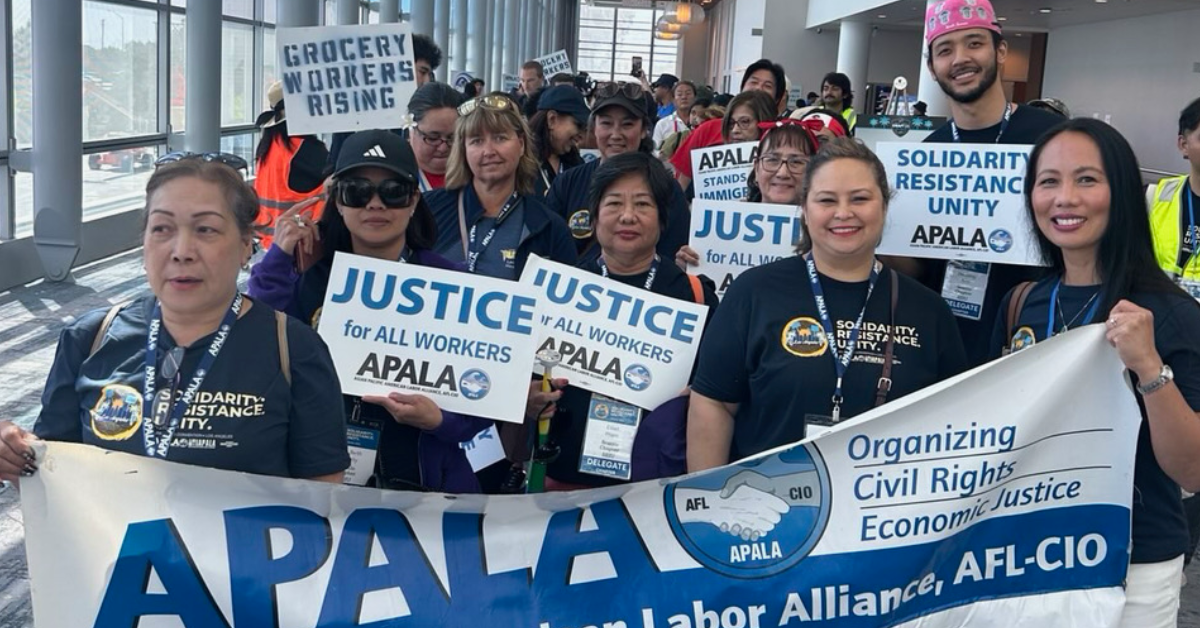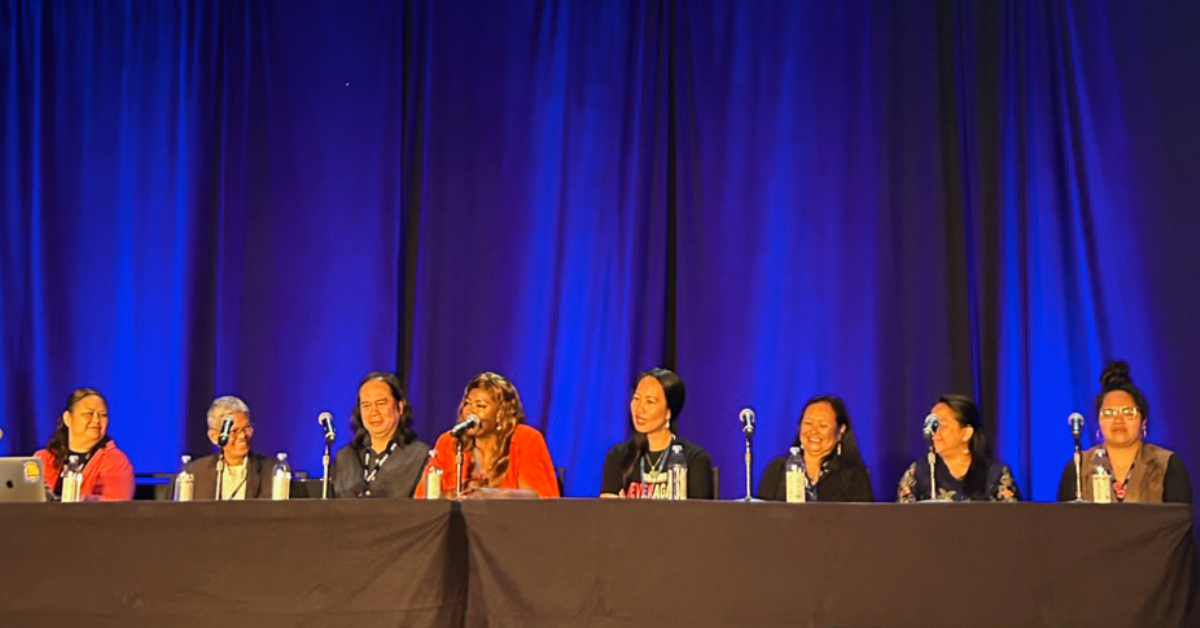OPINION
Solace, resistance, action at APALA’s 2025 Convention
As an Asian-American college student interested in deepening skills in labor and community organizing, APALA’s National Convention in June helped develop invaluable knowledge and insights
by PAIGE HAZEN
(August 27, 2025) — From June 26 to June 29, members of the Asian Pacific American Labor Alliance (APALA) convened in Los Angeles from all over the country in order to discuss and decide the organization’s priorities. APALA is a labor constituency group that was founded in 1992 as a response to the ongoing exclusion and racism Asian American, Native Hawaiian, and Pacific Islander (AANHPI) workers faced within unions. Since then, they have remained the only national organization for AANHPI workers, providing invaluable resources, advocacy, and political education for them.
The local Seattle Chapter is the largest in the country, sending over 40 delegates to the convention this year. Seattle members connected with each other as well as members from other cities, while also learning about the work everyone has been engaged in – from the local level to the international level.

Members of the Seattle delegation to the APALA Convention. Photo: Paige Hazan
An outstanding accomplishment this year was the delegation to the Philippines. A group of APALA members met with Filipino MetroWear workers earlier this year and learned all about the issues they are facing, such as how Filipino labor policies and temporary contracts prevent organizing and benefits, wages as low as seven dollars per day, and the dangerous political climate for labor activists – with trade unionists and leaders getting murdered.
In response, APALA helped organize actions all over the globe, from San Diego and Seattle to Cambodia and Myanmar. Organizers believe that it was due to the corporation’s concerns over public opinion and fear of escalation into boycotts that led them to quickly concede, as they ultimately agreed to every one of the workers’ demands. These included: not moving the factory out of the Philippines, reinstating all five of the people that were fired – four of which were labor leaders — subsidies in the case of shutdowns, and more.
Cindy Domingo, a longtime community activist currently sitting on the board of directors at Legacy of Equality, Leadership, and Organizing (LELO), was one of the leaders of the delegation to the Philippines. She has been doing Philippines solidarity work since 1974, and was able to utilize the strong relationships she has built with the Filipino labor movement over the decades to make the trip happen.
To her, this trip represented “the gains we [have] made in building relationships between the US and Philippines labor movements” and “the potential of what it really means to build international solidarity.” Domingo felt proud that she could share this story with the attendees of the APALA convention, to showcase what international labor solidarity actually looks like in practice.
She explained that the Filipino workers also sent out a solidarity statement to US workers in return, given their understanding that the conditions Americans are working and organizing under are getting closer and closer to the fascist state they themselves have experienced. Domingo emphasized that we have a lot to learn from the Filipino workers, given their history and struggles in overthrowing a dictatorship, and expressed frustration over the fact that the presidents of our unions still do not have a concrete program to fight fascism – let alone a willingness to label our conditions as such.
Moving forward, Domingo asks, “How will those in the labor movement who have a better analysis of what’s happening in this country … struggle with the top leadership of the labor movement to move their analyses ahead?” She further stated that “the scapegoating of immigrants is a key component of fascism,” and wishes that more people could make a connection to histories where fascists have utilized scapegoating to destroy democracies.

Photo: Paige Hazan
David Yao, a steward and vice president of the Seattle chapter of the American Postal Workers Union, expressed that the panel on the Philippines delegation especially stood out to him at the convention as it was the perfect case study of an international campaign with strong local ties. He wants to write about this campaign in his union’s newsletter in order to show what’s possible when we express solidarity globally. Additionally, following discussions on immigration rights at the convention, he is planning to publish an article on the state of the risks facing immigrant workers, and provide multilingual resources for his union members and their families.
“People are trying to figure out how to resist the regime that’s trying to bulldoze us,” said Yao. “Getting together you really feel the group solidarity. Hearing about campaigns like the Filipino delegation’s helps people know that there are others in the labor movement that have the same mindsets and passions, and it’s comforting to learn that.”
As a member of his union since 1986, David has witnessed immense growth in the acceptance of immigrants and workers of color. When he first joined, the leadership was all white, and now it’s more than half Asian. Given these trends, he believes there is a lot of potential in the labor movement to continue pushing forward immigrants’ rights and social justice for workers of color.
Another Seattle chapter member interviewed, a rank-and-file member of UAW 4121 (the union of academic workers at the University of Washington), has been very engaged in activism related to immigration rights, international workers, and undocumented students this year. She found that due to its unique position as a labor constituency group – as opposed to a labor union – Seattle APALA is quite comfortable and experienced in navigating and advocating for immigrant rights within unions. Given their history, APALA has a repository of organizing training resources, which came in handy for her as her union became the first at UW to host a know-your-rights training for its members. This was critical for the many union members who “felt the urgency of the moment and wanted to take action, but didn’t know who to talk to or how to change policies”.
She has also been organizing with the UW Rapid Response Coalition, which was formed with the intention of giving people an organizing home when they otherwise lacked one, or felt excluded from the ones they had. The majority of the members of this coalition are workers and union members, many of whom want to speak on social justice issues that extend beyond pay and benefits.
“Now that I understand APALA’s history more, I can lean on them to learn how to push on social justice issues without the union disintegrating,” she said. She observed that a union’s role in social justice movements always seems to be a point of contention, and thus “appreciates APALA’s orientation of how to broaden what a labor movement can look like”.
“The connections I made within [the Seattle] chapter were really meaningful, because I feel like the local level is super important. If you can’t understand the local level it’s hard to advocate for what you want on the national level.” She, along with many other attendees, found solace in the fact that the members of APALA are united over their mission in fighting for the protection of immigrant workers.
The APALA Seattle Chapter was also a leader in writing and passing resolutions at the convention, a process that serves to uplift different organizational priorities for all chapters of APALA nationally. They passed several on immigrant rights, solidarity with the Philippines, healthcare justice, and Native Hawaiian inclusion. In this moment of political upheaval and climate of fear, the APALA Convention served as a reminder that although there is still a long way to go before the labor movement reaches its potential as the strong defense it could be against raids and attacks on immigrants, there already exists a start right here within our own communities.
Paige Hazen is a Summer Organizing Fellow for the Asian Pacific American Labor Alliance (APALA). For more information on APALA or becoming a member, visit www.apalanet.org.





